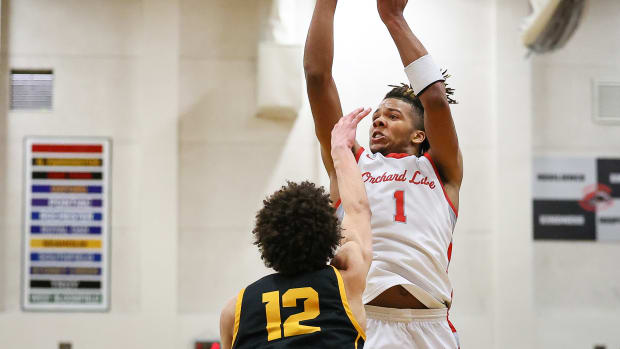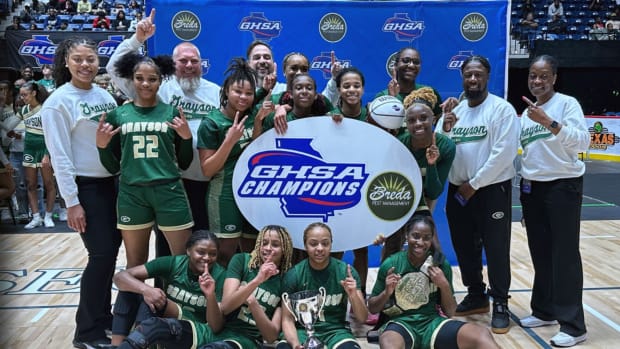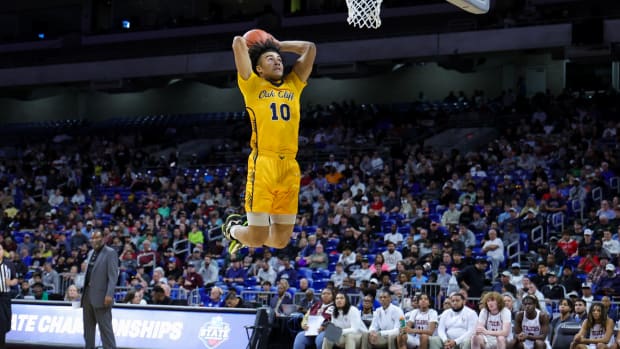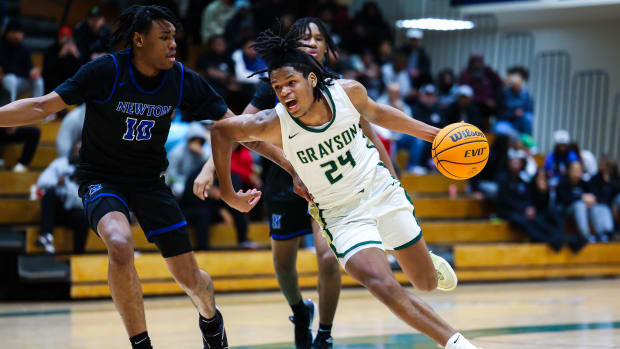
Remembering former MIAA Executive Director Rick Diggs
If the Maryland Interscholastic Athletic Association (MIAA) had a Mount Rushmore, only one face would yet be carved into its stone.
Among the many amazing athletes, brilliant coaches and dedicated administrators that have helped make the MIAA one of the nation’s preeminent private high school athletic conferences over the last 28 years, Reese “Rick” Diggs Jr. stands head and shoulders above them all.
Considered by many as the “Founding Father” of the MIAA, Diggs passed away at his home, surrounded by family, on December 10th, after a brief illness. He was 75.
Diggs did not actually found the conference, but shortly after the MIAA came into existence in 1994, he was hired as the MIAA’s first Executive Director. His initial task was to help develop the conference’s constitution and bylaws.
Diggs, along with the athletic directors and the school heads of the conference's member schools, created a self-governing model which put more autonomy in the hands of the schools, in terms of creating league guidelines. The executive committee's role was restricted to enforcing the rules, managing the league's operations and championships, and overseeing regular meetings and workshops where new proposals were debated and voted upon, while existing guidelines were updated or eliminated. The result has stood the test of time and served as a model for other conferences to follow. In addition, he provided diligent leadership for the newly formed organization which came about following the demise of the Maryland Scholastic Association (MSA), an athletic conference comprised of Baltimore City public schools and private schools throughout the Baltimore area.
It was not an easy task as the MIAA consists of nearly 30 schools, of various sizes, with unique cultures and different levels of resources, facilities. One of the master strokes of this planning was to not pigeonholed every athletic program at a given school into the same level of competitiveness, based on enrollment or other arbitrary factors. Recognizing that some schools excel in certain sports, but are far less competitive in others, the original constitution which Diggs oversaw, allowed schools, with the guidance and oversight of the MIAA's competition committee, to select which conference in which they felt most comfortable competing, on a sport by sport basis. In addition, he was masterful at building relationships and establishing consensuses which allowed the schools to work together for their common good.
He was also guided by a singular principal which he reiterated over and over again throughout his tenure, “It’s all about the kids.”
He remained in the role for more than 19 years, guiding the conference through tremendous growth, building up the stature of its championship events, creating greater opportunities for student-athletes and safeguarding the reputations of the league’s member institutions.

Former MIAA Executive Director Rick Diggs, who passed away on December 10th, led the all-boys athletic conference from its infancy to tremendous growth and helped establish its stature as one of the preeminent private school athletic conferences in the nation.
“Even though he was the Executive Director of the league Rick always reminded people that everything we did, ‘it was about the kids,’” said Paul Bernstorf, the current Executive Director of the MIAA who was a teacher, coach and athletic director at St. Paul’s School during the years Diggs led the association. “He always kept it in perspective. Rick was instrumental in developing the MIAA constitution and by-laws that still govern the association today.
“Personally, he was a great sounding board and was extremely helpful to me as a young AD. He went out of his way to support AD’s. He knew the time commitment of the job and he often tried to help. He gave of himself in so many ways. In my opinion he brought together the MIAA and launched one of the best interscholastic leagues in the country.”
Diggs, the son of former major league pitcher, Reese “Diggsy” Diggs grew up in southwest Baltimore and was a natural athlete, excelling in baseball and football.
Eventually he matriculated to Loyola High School (now Loyola Blakefield) where he was a star in both sports prior to his graduation in 1966. He was a natural leader, serving as a captain on both the varsity football and baseball teams, while also serving as Senior Class President. He also received the Howard Morris Trophy as the football team’s most outstanding player and, in 2014, was enshrined in the school’s athletic hall of fame.
His next stop was at Western Maryland College (now McDaniel College) where he also was a star in both football and baseball. As a senior he was once again named his school’s most outstanding football player, winning the Jim Stephens Award. He also added the Jim Boyer Award as the school’s most outstanding baseball player and, in 2008, was inducted in the school’s athletic hall of fame. In addition, he was a member of the WMC ROTC and graduated in 1970 as a 2nd Lieutenant in the United States Army.
After college, the transition to coaching and teaching was an easy one for Diggs, who majored in physical education.
He landed a job with the Carroll County public schools system where he spent 13 years, including six as the athletic director at Liberty High in Eldersburg.
After a 10-year stint helping run a family business, he eventually made his way to St. Vincent Pallotti High School in Laurel where he served for more than 30 years in roles that included vice president of operations, dean of students, director of advancement, interim principal, and athletic director.
He continued to work at Pallotti, an MIAA member school, while serving in the Executive Director position, and remained there for a number of years after stepping down from his post with the MIAA.

Before, during and after his tenure with the MIAA, Rick Diggs made enormous contributions to the growth and successful operation of St. Vincent Pallotti High School, where he served in numerous capacities over a span of three decades.
Shortly before his retirement from Pallotti, Diggs suffered a stroke which began his health decline.
“The member schools of the MIAA all owe a debt of gratitude to Rick for having the insight and fortitude to realize the need for private schools to have a presence in Maryland high school sports, after the dismantling of the MSA,” said Lee Dove, a former teacher, coach and athletic director at Archbishop Spalding High School, who succeeded Diggs in the role of MIAA Executive Director and served the conference until his retirement two years ago. “He was instrumental in the formation of the league and providing the leadership necessary for its launch. He lead by example and always stayed true to his mission to do things in the best interest of the student athletes.
“I personally respected him as a mentor, admired him for his dedication to the league and appreciated his support of me. In my transition to the Executive Director position after Rick’s retirement it was a priority for me that Rick would be proud of the way I provided the league with continued growth and direction.”
His influence was not limited to the MIAA.
“When I began my work with the IAAM in 2005, Rick was my ‘go to,’” said Sue Thompson, Executive Director of the Interscholastic Athletic Association of Maryland, the MIAA’s sister conference. “In those early years, he made me nervous, and he made me laugh but I could see that he always had the student-athletes front and center in his decision making. He was an excellent leader, a forward-thinker, and a good friend to many. In so many subtle ways, I could see that Rick was a kind soul and would do anything to help others.”
Perhaps Diggs’ most trusted confidant throughout the years was MIAA Executive Assistant Sandi Chisholm. Diggs hired Chisholm at his rental business when she was just 16 years old and brought her to the MIAA when he assumed the Executive Director’s role. She remained in the position throughout Dove’s tenure and continues in the role under Bernstorf.
“The first thing I think of every morning is the huge impact he has had on my life,” said Chisholm of Diggs. “We were just shy of 40 years of knowing each other. He gave me my first job. I was also a babysitter, house sitter and took his dogs to the kennel.
“I worked for him for 10 years before the business was sold and when he accepted the position with the MIAA, he offered me the opportunity to join him. He has been a father figure and a mentor and, more than anything, a dear friend.”
Diggs is survived by his wife of 53 years, Joyce, who he met while at Western Maryland and married immediately upon graduation. He is also survived by his children Kristen M. Diggs and Gregory Scott Diggs (Nichola), as well as three grandchildren. In addition, he leaves behind his brother James (Betsy) Diggs, sister Barbara (Bobbi) Quinn, brothers in law Fred (Carol) Wagner and Ken (Becky) Wagner and many nieces, nephews and cousins.
A memorial service for Diggs will be held on Monday December 18 (10:00 a.m.) at Lasting Tributes Cremation & Funeral Care in Annapolis.




